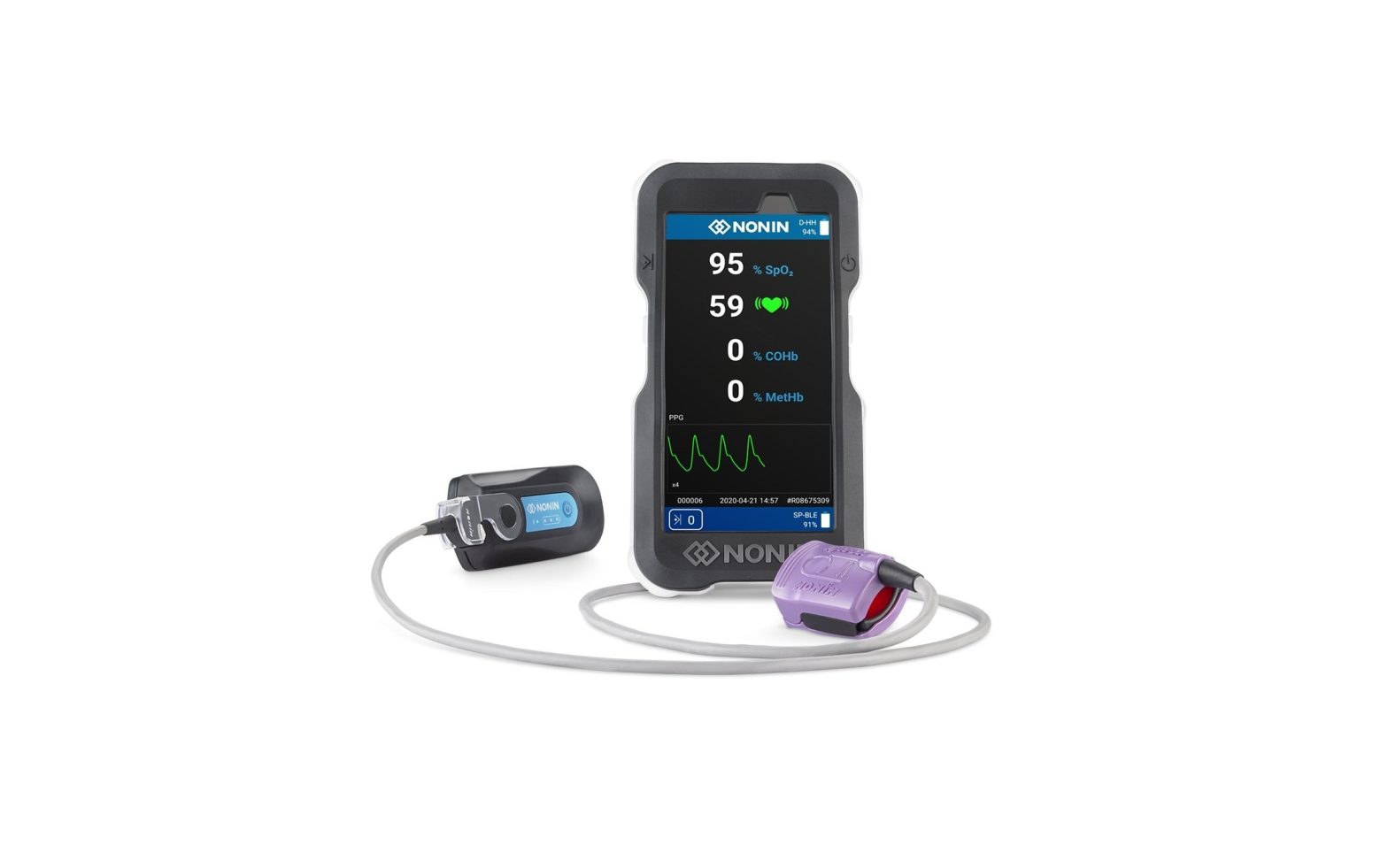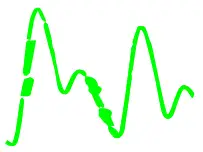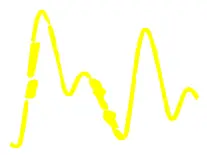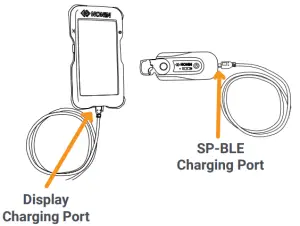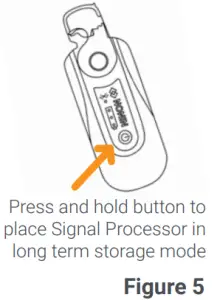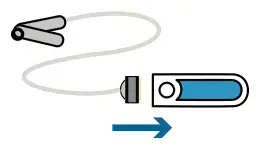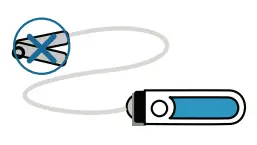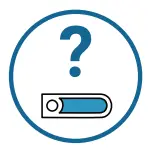Nonin CO-Pilot H500 User Guide
Refer to the CO-Pilot Wireless Handheld Multi-Parameter System (H500) Operator’s Manual for complete instructions for use to fully understand the device, its operation, and the potential risks to user and patient.
System Components
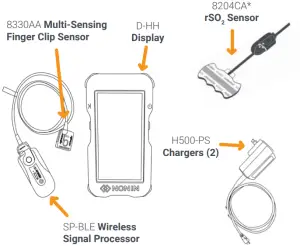
Display Icons & Indicators
Multi-Sensing Display Screen
rSO2 Display Screen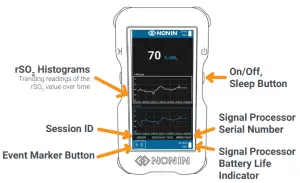
Signal Processor (SP-BLE)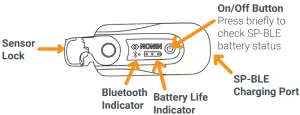
Initial System Setup
- Charge display and signal processor per instructions in Section 9
- Press and hold On/Off button on signal processor until green LEDs blink on and blue Bluetooth LED begins to blink
- Press and hold On/Off, Sleep button on display until screen turns on.
- Connect sensor to signal processor and engage sensor lock (Figure 1)
- System is now ready to take a measurement or to be put into Sleep Mode for future use

Taking a Measurement with CO-Pilot
- Activate the display from sleep mode by briefly pressing the On/Off, Sleep button on the right side of the device (Figure 2)
- When the display is activated, it will automatically be connected to the signal processor and the sensor will turn on
- If the signal processor is not automatically activated, press and hold down the On/Off button on the signal processor
- Place the sensor on the patient according to sensor instruction
- When operation is complete, briefly press the On/Off, Sleep button on the display to end the session and put device into Sleep Mode; signal processor will enter Sleep Mode automatically.

Placing Disposable rSO2 Sensor
- Connect INT-100 to signal processor as shown in Figure 1
- Connect 8204CA sensor to INT-100 and engage lock per Figure 3

- Remove the protective backing from the sensor pad and gently, but firmly place the sensor above the eyebrow per Figure 4
- Ensure sensor surface adheres to the skin to prevent light from traveling between emitting or receiving elements or ambient light from entering
NOTE: An improperly placed sensor may result in inaccurate readings. If sensor does not adhere fully, sensor may result in inaccurate reading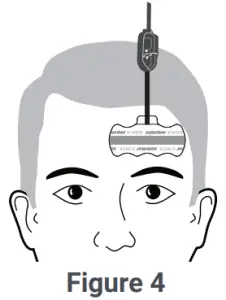
Placing Finger Clip Sensor
- Connect sensor to signal processor as shown in Figure 1
- Select proper sensor size and use a clean, dry finger. Heavy lotions, sunscreen, dirt, oils and nail polish may alter accuracy
- Gently squeeze open the sensor and insert the finger all the way into the sensor
Determining Pulse Signal Quality
Pulse signal quality can be determined by the color of the pulse waveform as shown.
- Green = Good

- Yellow = Marginal

- Red = Insufficient

Checking Signal Processor Battery Status
To check the signal processor battery status, quickly press the On/Off button on the signal processor. Green battery indicator lights will light indicating current battery status. Signal processor battery status can also be found on the display screen as shown in Section 02.
Signal Processor Battery Status Matrix
| Battery Indicator | Battery Level |
| Three green lights lit | High (60-100%) |
| Two green lights lit | Medium (20-59%) |
| One green light lit | Low (5-19%), charge SP-BLE |
| One green light blinking | Critical (0-4%), charge SP-BLE |
| No Lights | Depleted or off |
Charging the System
- Charge the display and signal processor (SPBLE) using the provided Nonin chargers ONLY
- Insert charger into respective ports shown below to charge.

Do not use system while charging
Long Term Storage Mode
- To place the display into long term storage mode, press and hold the On/Off, Sleep button on the display (Figure 2) until screen prompt appears
- Choose “Power Off” on display screen. Screen will go black, display is now in long term storage mode
- To place the signal processor into long term storage mode, press and hold the on/off button on the signal processor until all lights flash simultaneously. Signal processor is now in long term storage mode.

Basic Troubleshooting
- Sensor Not Connected to Signal ProcessorCheck that sensor is plugged into signal processor and sensor lock is engaged

- Sensor FaultSensor may be inoperable, try another sensor

- Inadequate SignalEnsure sensor is properly applied to patient

- Cannot Connect to Signal ProcessorCheck that signal processor is on, battery is charged, and in range of display

- Error CodeRefer to Operator’s Manual

COHb Quick Reference
Carbon monoxide (CO) is an odorless, colorless gas that can remain undetectable until exposure results in injury or death. CO poisoning can lead to a variety of clinical effects that resemble many neurological and cardiovascular conditions, leading to potential misdiagnosis.
Common Symptoms of CO Poisoning
- Headache
- Dizziness
- Fatigue and Weakness
- Loss of Consciousness
- Nausea
Important Symptom Considerations
- A patient exposed to high concentrations for a short time may be less symptomatic than a patient who reaches the same COHb level after a prolonged exposure.
- Chronic poisoning is generally associated with the less severe symptoms.
- Some patients presenting with a carboxyhemoglobin level of 20% may be remarkably symptomatic, while others experiencing the same level of COHb% may exhibit only mild, equivocal symptoms.
- Low-level exposure can exacerbate angina and chronic obsutrctive pulmonary disease.
- Coronary artery disease patients are at risk for ischemia and MI even at low levels of CO.
- Severity of clinical condition is related to CO conentration, the duration of exposure, and the prevailing clinical disposition of the patient.
- Smokers present with higher levels of COHb than do non-smokers. The COHb level in non-smokers is approximately 1-2%. In smokers, a COHb of 3-8% would be considered normal, depending on severity of smoking.
Treatment
| Carbon Monoxide: Half Life Elimination from Blood | |
| Room Air | 240-360 minutes |
| Oxygen (100%) | 80 minutes |
| Hyperbaric Oxygen (HBO) | 22 minutes |
COHB Exposure Treatment Decision Process
If CO exposure is NOT suspected:
Noninvasive COHb values should NOT be used
If CO exposure IS suspected:
Patient has signs and symptoms, transportation to the hospital is recommended even if the COHb is <10%
Patient has COHb ≥10%, transportation to the hospital is recommended, even if asymptomatic
Nonin Medical, Inc.13700 1st Avenue NorthPlymouth, MN • 55441-5443 • USA
Tel: +1.763.553.9968 1.800.365.8874Fax: +1.763.577.5521Email: [email protected]
Nonin Medical B.V.Doctor Paul Janssenweg 1505026 RH Tilburg • Netherlands
Tel: +31 (0)13-79 99 040Fax: +1 (0)13-79 99 042Email: [email protected]
NONIN Website: nonin.com
References
[xyz-ips snippet=”download-snippet”]

